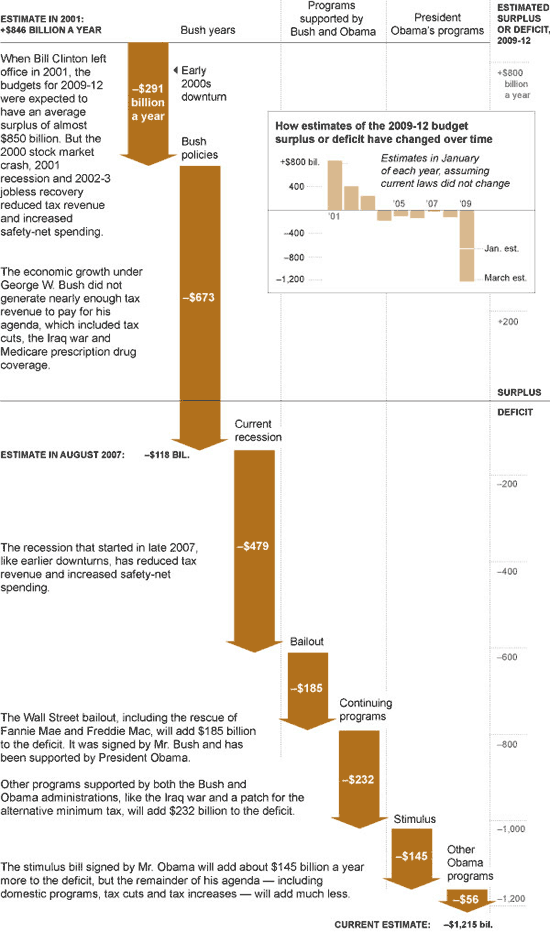Today’s NYT has a front page article debating whether Pres. Obama has a realistic plan for eliminating the enormous deficits that the federal government will run in the coming years ; and how this debt will constrain our choices in the future. Let’s keep in mind the fact that our economy can sustain severe economic damage if foreign lenders decide to no longer finance our debt. Here are a few excerpts from the article:
From The NYT:
The story of today’s deficits starts in January 2001, as Pres..Clinton was leaving office. The Congressional Budget Office estimated then that the government would run an average annual surplus of more than $800 billion a year from 2009 to 2012. Today, the government is expected to run a $1.2 trillion annual deficit in those years.
You can think of that roughly $2 trillion swing as coming from four broad categories: the business cycle, Pres…W. Bush’s policies, policies from the Bush years that are scheduled to expire but that Mr. Obama has chosen to extend, and new policies proposed by Mr. Obama.
…
Mr. Obama’s main contribution to the deficit is his extension of several Bush policies, like the Iraq war and tax cuts for households making less than $250,000. Such policies — together with the Wall Street bailout, which was signed by Mr. Bush and supported by Mr. Obama — account for 20 percent of the swing.
…
Alan Auerbach, an economist at the University of California, Berkeley, and an author of a widely cited study on the dangers of the current deficits, describes the situation like so: “Bush behaved incredibly irresponsibly for eight years. On the one hand, it might seem unfair for people to blame Obama for not fixing it. On the other hand, he’s not fixing it.”“And,” he added, “not fixing it is, in a sense, making it worse.”
…
“Things will get worse gradually,” Mr. Auerbach predicts, “unless they get worse quickly.” Either a solution will be put off, or foreign lenders, spooked by the rising debt, will send interest rates higher and create a crisis.The solution, though, is no mystery. It will involve some combination of tax increases and spending cuts. And it won’t be limited to pay-as-you-go rules, tax increases on somebody else, or a crackdown on waste, fraud and abuse. Your taxes will probably go up, and some government programs you favor will become less generous.
That is the legacy of our trillion-dollar deficits. Erasing them will be one of the great political issues of the coming decade.
emphasis added
The numbers that appear below are the average annual deficit or surplus for the years 2009-12.

Image: NYT
- Bulenox: Get 45% to 91% OFF ... Use Discount Code: UNO
- Risk Our Money Not Yours | Get 50% to 90% OFF ... Use Discount Code: MMBVBKSM
Disclaimer: This page contains affiliate links. If you choose to make a purchase after clicking a link, we may receive a commission at no additional cost to you. Thank you for your support!

Leave a Reply